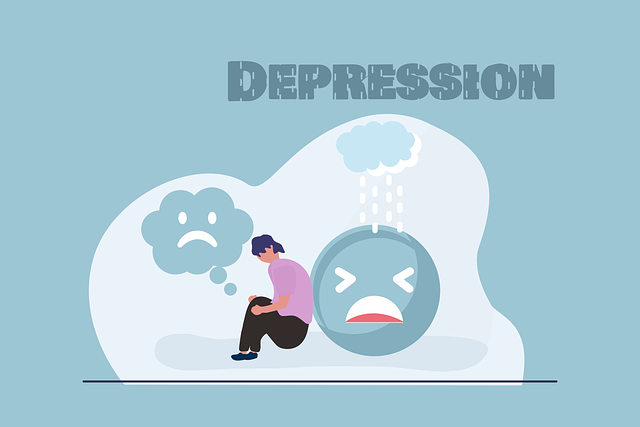Mental health professionals in Boulder Sexual Dysfunction Therapy must navigate complex risks, from burnout to technological vulnerabilities. Effective risk management involves integrating Trauma Support, Compassion Cultivation, and Self-Care practices to create safe therapeutic spaces. A structured risk management plan, including crisis intervention, cultural sensitivity training, and clear communication protocols, is essential for client safety and positive mental health outcomes. Continuous assessment and adaptation are key to addressing the dynamic nature of mental illness, fostering a supportive environment free from stigma.
In the demanding field of mental health, professionals must be adept at managing risks to ensure client safety and deliver effective therapy. This comprehensive guide explores essential risk management planning for therapists, particularly focusing on strategies relevant to sexual dysfunction treatment in Boulder. From understanding nuanced risks inherent in mental health practice to implementing adaptive measures, this article equips professionals with tools to create secure, therapeutic environments, fostering positive outcomes.
Let’s dive into the critical components of effective risk management.
- Understanding Risk in Mental Health Practice
- Identifying Potential Hazards and Vulnerabilities
- Developing a Comprehensive Risk Management Plan
- Implementing Strategies for Safe and Therapeutic Environments
- Continuous Monitoring and Adaptation: Ensuring Client Safety
Understanding Risk in Mental Health Practice

Understanding risk in mental health practice is a cornerstone for professionals like those providing Boulder Sexual Dysfunction Therapy. Each client enters the therapeutic space with unique challenges and potential triggers, from past traumas to current stressors. Recognizing and assessing these risks is paramount to delivering effective care. Mental health practitioners must be attuned to the possibility of exacerbating existing conditions or introducing new ones during therapy.
In this context, Trauma Support Services, Compassion Cultivation Practices, and Self-Care Practices become essential tools. By incorporating these strategies into their risk management plans, therapists can create a safe, supportive environment that fosters healing while mitigating potential risks. This proactive approach ensures that clients receive the highest quality care possible, tailored to their specific needs and vulnerabilities.
Identifying Potential Hazards and Vulnerabilities

Mental health professionals, like those offering Boulder Sexual Dysfunction Therapy, navigate a complex landscape where patient well-being is paramount. Identifying potential hazards and vulnerabilities is the first step in robust risk management planning. These can stem from various sources—from interpersonal dynamics and sensitive subject matter to institutional policies and technological vulnerabilities. For instance, therapists must consider the impact of burnout on their own mental health, which could inadvertently affect their ability to provide quality care.
Furthermore, in an era where digital communication is increasingly prevalent, professionals must be vigilant about online security and privacy concerns. This includes safeguarding patient data through robust cybersecurity measures and ensuring ethical use of technology in therapy sessions. Effective risk management also involves cultivating strong social skills and communication strategies, which can help mitigate potential misunderstandings or inappropriate boundaries, promoting a safe and supportive therapeutic environment.
Developing a Comprehensive Risk Management Plan

Developing a comprehensive risk management plan is an essential step for mental health professionals to ensure the safety and well-being of both their clients and themselves, particularly in diverse practice settings like Boulder Sexual Dysfunction Therapy. This strategy involves identifying potential risks and hazards unique to the field, such as complex client cases, confidential information handling, and personal boundaries. By implementing robust protocols, therapists can mitigate these risks effectively.
The plan should encompass various aspects, including crisis intervention procedures, trauma-informed care practices, and cultural sensitivity training, especially when addressing issues like self-esteem improvement in a diverse community. Incorporating strategies from the Mental Wellness Podcast Series Production can enhance communication and documentation, ensuring every step is well-documented for future reference and learning. This proactive approach not only protects professionals but also fosters a supportive environment conducive to positive mental health outcomes.
Implementing Strategies for Safe and Therapeutic Environments

Creating safe and therapeutic environments is a cornerstone of effective mental health practice. For professionals like those offering Boulder Sexual Dysfunction Therapy, this involves implementing strategies that foster trust, respect, and confidentiality. A robust risk management plan should incorporate clear boundaries and communication protocols, ensuring every interaction respects client privacy while enabling open dialogue.
This can be achieved through structured intake processes, comprehensive consent forms, and regular debriefing sessions for staff. By integrating Mental Health Policy Analysis and Advocacy into daily operations, professionals can identify and mitigate potential risks, enhancing the overall safety of their practice. Furthermore, Mental Wellness Coaching Programs Development can equip both clients and practitioners with coping mechanisms, promoting a resilient environment conducive to healing. Regular risk assessments are essential tools in this process, allowing for proactive measures to address emerging challenges, ultimately benefiting client outcomes.
Continuous Monitoring and Adaptation: Ensuring Client Safety

In the dynamic field of mental health care, continuous monitoring and adaptation are indispensable for ensuring client safety. This involves regular assessment and reevaluation of each patient’s unique needs, especially as their conditions may evolve or new challenges arise. At Boulder Sexual Dysfunction Therapy, we recognize that mental illness is not static; it can change over time, influenced by a myriad of factors such as life events, stress management strategies, and cultural shifts. Therefore, our risk management planning incorporates dynamic assessment protocols to identify potential risks and implement timely interventions.
By fostering a culture of continuous learning and adaptation, mental health professionals can better navigate the complexities of their clients’ lives. This includes staying updated on best practices in stress management, integrating cultural sensitivity in mental healthcare practice, and addressing the pervasive Mental Illness Stigma Reduction Efforts. Such proactive measures not only enhance patient safety but also foster an inclusive and supportive therapeutic environment where individuals feel empowered to embark on their journey towards healing and well-being.
Mental health professionals must prioritize risk management to ensure safe and therapeutic environments, especially in addressing complex issues like sexual dysfunction (Boulder Sexual Dysfunction Therapy). By understanding risk, identifying potential hazards, and implementing comprehensive strategies, practitioners can foster secure spaces that enhance client outcomes. Continuous monitoring and adaptability are key to staying vigilant against emerging vulnerabilities, ultimately upholding ethical standards and client well-being.














